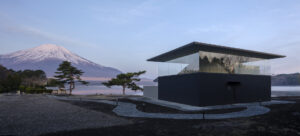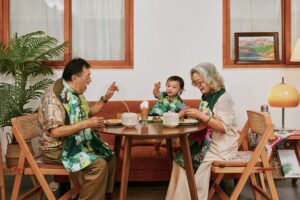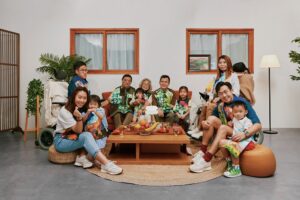Design in Focus: Inclusive Design and Sustainable Development Principles
For the last two decades, inclusive design and sustainable development principles have evolved to become more mainstream, transformed from niche considerations into essential components of contemporary design practice. Driven by the rise of user-centered design and participatory design methodologies, as well as climate change awareness and the global push for sustainability, designers and design firms have increasingly embraced this movement.
This is the case for two winners of the Design for Asia DFA Awards Grand Award in 2024: YU Momoeda Architects who designed CYCL, a sauna located in Yamanakako Village in Japan, and Rhys Workshop who created Boundless, a brand designing clothes for people of all ages and physical conditions.
CYCL, Integrating the architecture into the landscape
To design CYCL, a sauna located in Yamanakako Village in Japan, YU Momoeda Architects aimed to integrate the architecture into the landscape that reflects the region’s history. Translating this relationship into the architecture, they created a wooden framework resembling a mountain rising from the earth, lightly floating the steel roof.
“In this region, people have historically predicted the weather by observing the Kasa Cloud over Mount Fuji. Inspired by this landscape, we designed a mountain-like structure with a floating roof, creating spaces with distinct characteristics of concentration and liberation within the ‘mountain’ (ground floor) and outside (first floor). On the ground floor, where the main sauna functions are planned, visitors can experience the brightness of the sun in the sauna room, the sound and coolness of underground water in the flowing cold bath, and the comfort of the wind in the indoor relaxation area,” the architects explain.
The sauna utilises natural energy through skylights and ventilation, employing traditional Japanese construction methods with locally sourced timber to minimise carbon emissions. This innovative approach supports local industries and ecosystems and promotes sustainable practices in the village.
“Despite being a unique three-dimensional structure, the design utilises traditional Japanese wooden framework construction methods that have been ongoing in Japan for centuries. This combines locally sourced timber, contributing to carbon emission reduction, with the excellent craftsmanship of local carpenters. The roof structure utilises steel trusses fabricated by local steelworks, creating a hybrid structure that incorporates various local industries. Furthermore, by using concrete only for the foundation and lightweighting the overall construction, the design avoids methods such as surface improvement that would increase the land’s bearing capacity, minimising its impact on the land. In a beautiful village facing depopulation, achieving architecture that allows people to connect with nature not only propagates technological advancements to the future but also fosters local pride and raises awareness of sustainable cycles,” the architects further explain.
Boundless, Design for all, Transcending the boundaries
In a world where fashion often caters to idealised body types, Boundless challenges the status quo with an inclusive design that transcends boundaries. They follow inclusive design key principles: understanding the diversity, user-centered approach, universal design principles, and cultural sensitivity.
Boundless is designed to solve the problem of limited fashion choice for people with different physical conditions, especially the elderly and people with impairment, to break the tradition that fashionable items only fit with standard body types.
“The inclusive designs feature a watercolour theme and combine functionality with style, the clothing incorporates velcro and waistband to facilitate easy wearing, using 100% cotton fabric and water repellent polyester. For example, our scarves feature a two-way design with water-repellent fabric that can serve as a bib for the elderly. They also include an open pocket at the hem to catch food drops, and can be transformed into an apron with a detachable waistband, making them useful for all family members,” explains Rhys Workshop team.
For the design team, “fashion is an essential part of everyone’s lives; it should be accessible and relatable. Inclusive fashion is one of the best ways to demonstrate how beauty and functionality can have a meaningful impact on all individuals. Our designs foster unity, allowing the entire family to enjoy and benefit from our products together. Rather than reinforcing stereotypes by providing separate clothing for the elderly and disabled, we encourage families to celebrate their love and connection.”
By combining inclusive design with sustainable development principles, designers, such as YU Momoeda Architects and Rhys Workshop, create environments and products that are not only accessible to everyone but also considerate of the planet. This holistic approach fosters a more equitable and sustainable future.





